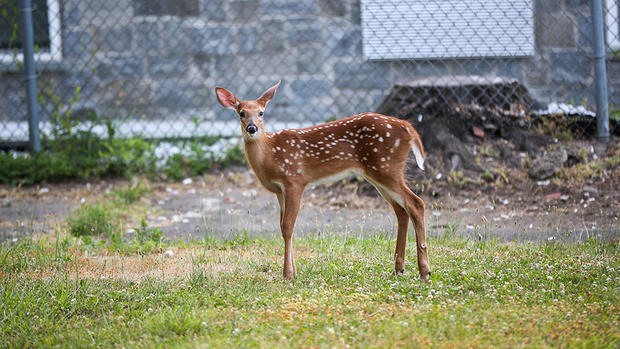Deer spread COVID to humans multiple times, new research suggests
Americans have transmitted COVID-19 to wild deer hundreds of times, an analysis of thousands of samples collected from the animals suggests, and people have also caught and spread mutated variants from deer at least three times.
The analysis published Monday stems from the first year of a multiyear federal effort to study the virus as it has spread into American wildlife, spearheaded by the U.S. Department of Agriculture's Animal and Plant Health Inspection Service, or APHIS.
Scientists analyzed 8,830 samples collected from wild white-tailed deer across 26 states and Washington, D.C., from November 2021 to April 2022, to study the COVID variants that had infected 282 of them.
By comparing sequences from the viruses in deer against other publicly reported samples from databases of human infections around the world, they were able to trace the likely spread of these variants between humans and animals.
A total of 109 "independent spillover events" were identified, matching viruses spotted in deer to predecessors it likely descended from in previously infected humans.
Several of these viruses appear to still be mutating and spreading between deer, including the Alpha, Gamma, and Delta variants of concern that drove an increase in deaths earlier in the pandemic, long after these lineages were subsumed by the wave of Omicron variants that continue to dominate nationwide.
Eighteen of the samples had no "genetically close human SARS-CoV-2 sequences within the same state" reported, foiling efforts to track down a precursor variant in humans.
"Overall, this study demonstrated that frequent introductions of new human viruses into free-ranging white-tailed deer continued to occur, and that SARS-CoV-2 VOCs were capable of persisting in white-tailed deer even after those variants became rare in the human population," the study's authors wrote.
Three had mutations that match a distinctive pattern of first spilling over from a human to deer, and then later another so-called "spillback" from deer back into humans. Two of these spillback variants were in North Carolina and one was in Massachusetts.
An investigation with the Centers for Disease Control and Prevention was able to track down three people who were infected by a variant with this hallmark deer mutation, as well as a handful of zoo lions who were also infected by the same strain.
None of the humans said they had close contact with either deer or the zoo.
Zoonotic diseases
APHIS researchers have been studying whether white-tailed deer, among several American wildlife species, could potentially serve as a long-term so-called "reservoir species" to harbor the virus as it mutates adaptations to spread among deer.
A previous report from scientists in Canada found "a highly divergent lineage of SARS-CoV-2" that spread from deer to humans.
Government scientists are also concerned with how the virus could affect animals, as it spreads between humans and wildlife.
"Deer regularly interact with humans and are commonly found in human environments — near our homes, pets, wastewater, and trash," University of Missouri Professor Xiu-Feng Wan, an author of the paper, said in a news release announcing the results.
The paper's authors pointed to other examples of diseases spreading between people and deer, like a previous outbreak of bovine tuberculosis among deer that was linked to local "supplemental feeding" efforts to prop up wild deer populations in Michigan.
The CDC has previously urged Americans to avoid close contact with wildlife and their droppings, both to minimize the spread of SARS-CoV-2 as well as other dangerous so-called zoonotic diseases that spread between humans and animals.
"The potential for SARS-CoV-2, or any zoonotic disease, to persist and evolve in wildlife populations can pose unique public health risks," Wan said.




